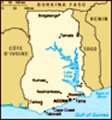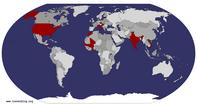Advertisement
Published: June 23rd 2017
Geo: 4.80969, -1.93537
As we'd hoped, a week at the Green Turtle Lodge on the west coast has rejuvenated us and renewed our hopes for our time in Ghana. Certainly, the idea that "less is more" is in play here at Green Turtle - eight thatched huts facing the beach alongside a thatched bar/dining annex.
We're "off the grid" here; solar panels on each hut gather enough energy to power lamps for a few hours each night. Toilets are self-composting and shower water is caught so that the surrounding plants are watered. We finally found our Ghanaian paradise.
Never before, in all of our combined travels, have we found such an untouched beach. We are near the village of Akwidaa which sits on a sandy beach lined with coconut-bearing palm trees. A mangrove forest lines the back side of the village, providing fish and crabs for the local dinner tables.
Named for the turtles that lay their eggs on the beach in the fall, this place is quiet and secluded (right now, at least) from mass tourism that has taken over the beaches of India, Thailand and Indonesia. We were taking a walk down the beach and we did not see another living
soul. It was just us, the sand, the waves crashing on the shore, and the soothing sounds of Barry Manilow's "Can't Smile Without You" played in the background (HA HA!). We had finally found a peace that we have been hoping for as we escaped Accra.
Now, if you are picturing an idyllic setting, it is almost that, but remember, we are still in Africa, which means that a lack of sanitation and improper garbage disposal is sometimes evident. Among the coconut carcasses littering the beach, you see the evil plastic bags, and yes, like in India, a random discarded shoe...
As we took long walks down the beach, we pondered why (thankfully) this place has not been hit hard by tourism. As we began to meet people at the Green Turtle Lodge, we soon found out one possible reason.
We met several couples who were intent on driving from Europe to South Africa, but fell in love with the Ghanaian coast around Green Turtle. These "overlanders" went no further than the Green Turtle Lodge and decided to purchase beachfront plots around it.
They told us that the surrounding village chiefs own the land and all purchases must be transacted through
the chiefs. Most of the business is done without paperwork. Instead, the deals are based on trust and spoken words, The deal is sealed by pouring "libations" or hard liquor (usually schnapps) over the land. Once the land has changed ownership, it does not mean that you own everything on the land. We learned that the palm trees which bear coconuts actually belong to village farmers. A new landowner can either buy each tree from them and have the option of cutting it down, or keep the trees standing and the farmers harvest the coconuts when they mature.
We were trying to figure out why tourism, thus far, is not a big industry on this part of the coast. One theory is that village chiefs would prefer to make a quick buck off the land, instead of investing the time, money and energy to build a lodge and capitalize on tourism themselves. There very well may be other reasons. As we understand it, tourism is still in its infancy in Ghana and the true commercial potential has yet to be reached - which is most of the case for W. Africa.
On one hand, this possibility is a bit troubling
given that we've been to plenty of other previously "untouched" places around the world, which have now been irreparably scarred by the likes of Hilton hotel, etc. We're excited to be able to visit some place before it gets trendy and touristy; perhaps the Ghanaian coast is like Bali was in the 1970's (before a Hard Rock Cafe, Pizza Hut, etc. appeared on the beach in the 90's)
On the other hand, the growth of tourism can bring much needed jobs to an area, especially if the birth of tourism occurs with the input of local government. We were pleased to find out that this may be the case here. The couples we met who bought land are planning to maintain the integrity of the environment and "buy local" (food and building materials, that is). They have also hired villagers to build and staff the resort(s).
We were told of some Californians (they're always behind real estate problems, right Portlanders!) who have bought a huge plot of land on the far end of the beach. Their idea is to build a concrete structure with big glass windows and bring the "vibe" to Ghana (apparently by way of some sort of
disco). As if Ghana's coastal vibe isn't good enough!
We were making bets on how much this prime beach front real estate cost. We were floored when we learned the current approximate price - about $2500 an acre! That combined with the beauty of the area made it clear to us why those we met didn't go any further in their overland journeys.
After seven days of being beach slugs, we traveled to the town of Cape Coast. We were not so happy to be in a busy town and away from the solace of the beach. Once we got over the shock of seeing cars and people again, we began to take a closer look at the city. Cape Coast, founded in the 15th century, traded hands between the Portuguese and Dutch before it became the capital of Britain's Gold Coast colony. It has also played a prominent role in the trans-Atlantic slave trade, from which approximately 42% of captives were sent to the United States.
We took a tour of Cape Coast castle, which was the last glimpse of their land that many Africans saw before being shipped off to slavery new lands - that is if they survived
the dungeons where they were held.
Taking a tour of the castle where 1000 captives were held at any given time before being shipped off, lends perspective to just how savagely these human beings were treated. We stepped into the dungeons that were the size of our living room with one small window for ventilation and being told that it held 200 people. Certainly, folks were treated worse than animals. We saw the infamous "Door of No Return." Interestingly, a few years ago, the remains of several African slaves were returned from the New World and, in a ceremony, brought back through that door; the other side is now marked "Door of Return."
Simply put, we were overwhelmed to be at the setting of such an atrocity. We learned that people were captured by their fellow Africans of differing tribes. But we were reminded that it was the "Whites" who propagated the whole system, and made the slave trade lucrative for the stronger tribes.
The town of Cape Coast itself is quite charming, almost making one forget the atrocities that were once committed in the region. Old colonial buildings are mixed in with modern-looking buildings and shacks that serve as stores and homes
for the residents of the town. Cape Coast is like a lonely old man who has led a rich life and has many stories to tell if you take the time to listen. One must look closely at the buildings and look past their states of disrepair to see the stateliness and imagine the lives that used to be lived with in the walls. It is a shame that more emphasis is not (or, more likely, cannot) placed on preserving these buildings.
Cape Coast was the first place in Ghana where we could meander down the streets and enjoy the surroundings and talking with the locals. We also enjoyed sampling the Cape Coast pineapple, which is the best pineapple on this earth!
We also spent some time visiting with our friend Mary whom we met on the bus coming down from Burkina Faso. She spent the day with us in Elmina, a neighboring fishing town and home to the Portuguese (and then Dutch) slave-trading castles.
Mary is in fashion design school here, but came to Ghana from Liberia as a refugee during their war in the 90's. She spent several years in the Liberian refugee camp outside of Accra. We felt
like we didn't know her well enough to ask her to reflect on this momentous change - from civil war refugee to design school in just a few years. But her story is indicative of the amazing perseverance we've come across this year while traveling.
So that ended our "holiday" time in Ghana and now it is back to work up in the rural area of Ghana.
We wanted to add a few more examples of the Christianity-based commercial signage we see everywhere. They are strong reminders of people's reverence here. There is:
"Here I Am Lord - Funeral Decorations"
"Favor of God - Electric Services"
"Innocent Blood - Cold Storage" (frozen foods)
"I Beg Thee God - Tourist Bar" and
(perhaps the too-optimistically named) "Salvation Drinking Bar"
One a completely different note, but something we wanted to comment on is how some experiences change you in subtle ways and sometimes they have a very overt impact. As we go through this year abroad, we are clear on one major change that surprises us both - we have become soccer fans.
We have never in our lives sat down and watched a soccer game on TV, until Ghana. When in Ghana, do as the Ghanaians - watch
football. Ghana is completely crazy about soccer and for a good reason - this is the first time in history that Ghana has made it to the World Cup. The spirit across the country is infectious and it is hard not to get sucked in. Passing through a small village on a tro-tro, we had to wait for the road to clear - about 40 men were huddled around a TV watching a match. Even at the Green Turtle Lodge (which doesn't have electricity), they brought in a generator and TV to watch the games. We find ourselves stopping along the road to catch the score of the current game. We'll see if our new found past time extends to getting cable TV at home, but we do have a new found appreciation for the game. This is unpatriotic to say, but we are happy that Ghana beat the USA - Go Black Stars!
Advertisement
Tot: 0.151s; Tpl: 0.014s; cc: 9; qc: 50; dbt: 0.0743s; 1; m:domysql w:travelblog (10.17.0.13); sld: 1;
; mem: 1.2mb
























bronwen
non-member comment
We missed saying goodbye Hi Jamie, Justin When you said you were leaving on Monday, we didn't realise that meant the next day (shows how time realy is irrelevant on the Ghana coast!) Good to meet you and thanks for looking after Sprite (e
specially when she was misbehaving). We made a rash decision and chose to leave the building of a small mud hut to our friends in the village of Akyinim whilst we drove home as quickly as possible to collect our belongings and to sell Bronwen (I have a tear in my eye as I say this!). We'll be back to our mud hut in August to start our new life. Will be keeping a keen eye on your further travels - have fun, keep safe and enjoy... all the best,Claire and Jamie (the male 'Jamie' that is!)www.travelpod.com/members/bronwen